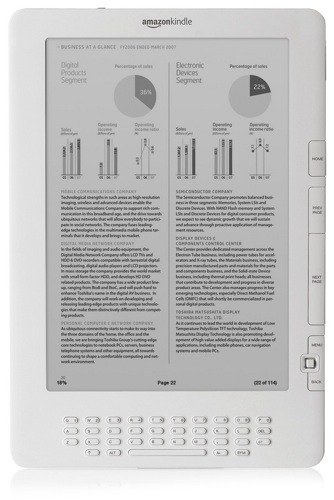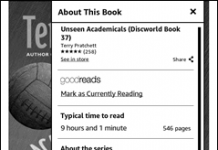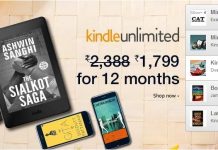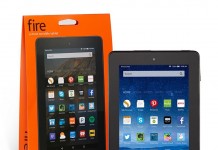 The Financial Times reports on the experience of University of Virginia students in the Darden School of Business, who were issued Kindle DXes as part of a pilot program to see whether they could successfully replace paper textbooks. (Note: The Financial Times has a paywall; if you cannot view the article, search “No substitute for a paper read” in Google News.)
The Financial Times reports on the experience of University of Virginia students in the Darden School of Business, who were issued Kindle DXes as part of a pilot program to see whether they could successfully replace paper textbooks. (Note: The Financial Times has a paywall; if you cannot view the article, search “No substitute for a paper read” in Google News.)
It turns out that for most students, the answer is “no”: although most agree they make great personal reading devices, almost 3/4 of the 63 students participating in the project said they would not recommend the device to an incoming student for use in school work.
For reading fiction, they work well, but the lack of color and zooming options for PDFs mean that they can be problematic for reading textbooks. It is also much harder to take notes than with a pencil or computer.
However, the college’s professors say they are still working on converting their course materials to e-book formats, and feel that the iPad might correct some of the deficiencies the students noted in the Kindle DX.
































How many different ways and times do people need to have it reinforced that slapping a textbook into digital form does not magically make it the same as a printed book? But no, “professors say they are still working on converting their course materials to e-book formats, and feel that the iPad might correct some of the deficiencies the students noted in the Kindle DX.”
Might correct? Have they not heard of the thing called ‘research’, or maybe ‘user testing’, ‘consumer focus groups’ or even ‘requirements gathering’? I guess those would be too much work. Its easier to hope that the next shiny gadget ‘might correct the deficiencies’ of the no-longer-shiny previous gadget, as long as someone else picks up the tab.
One can only hope Darwin was right, and that evolution will correct the deficiencies of the current crop of ‘professors’.
” … the lack of color and zooming options for PDFs mean that they can be problematic for reading textbooks.” Not to mention the problems with pagination. The minute a professor says “please turn to page 101,” the Kindle guys are SOL.
I was a literature major and probably 3/4 of my course materials are now available ob-line for free. The other quarter are available in ebook for a fee. If I were doing the degree now instead of 1996, I would have saved a fortune on textbooks.
Wonderful article, marvelous comments. As textbook-replacement tools, ebooks are primitive and frustrating. Until students can do everything with them that they can do with a book and more, they’re more hassle than benefit.
Markup is particularly important to students. I’d love to see ebooks have two modes. One would be ‘as published,’ the other would display student markups that could include highlighting, bolding, added notes, and even the ability to break the text to insert summaries and comments. Switching between the two would only take a couple of seconds. We might even have a notes only mode or a notes and selected text mode to exclude what isn’t going to be on the test. And easy way to exchange notes with other students would also be a plus. Most of this technology exists with Bible study tools, but apparently nowhere else.
And as Fradiavolo points out, ebooks need the equivalent of pagination. Without it, it’s impossible to talk about what a book is saying. That could be done by encoding the page breaks of the printed version into an ePub file and displaying it some way like light grey lines and numbering. It could also be done by having a page emulation mode as well as the current text-flow mode. In the former, a book’s pages would break the same on a Kindle as they do on an iPad. “Please turn to page 101” would work. Any reader with a screen as large as the current 9.7 inches of the Kindle and iPad could do this without the text being too small.
The sad fact is that ebooks are in the same situation personal computers were in before IBM inadvertently imposed an industry standard. Incompatible formats, software/books that have to be hand tooled for each company’s machine, and grossly limited abilities due to the relatively small market. Someone has to break out of this technological ghetto in which every company tries to control the market with proprietary standards, resulting in a product so poor, the market remains a small niche. (I’m looking at you Amazon.)
Whether Apple will serve, deliberately or inadvertently, as the IBM who sets standards is still unclear. As usual, they’re playing with their cards close to their chest. I’d love to be writing and editing books for publication on iPads, but they don’t seem to be sharing their schemes with anyone outside the Big Five publishers and a few large newspapers and periodicals. Not good.
We also need software to create these new books, software that doesn’t require CSS/XML skills, so we can create useful, powerful ebooks without being geeks.
Sadly, this technology isn’t at the cutting edge stage. It’s at the still-in-labor and not-yet-born stage. If Steve Jobs isn’t its midwife, someone else will have to take on that role and pound some sense into a fragmented industry.
–Michael W. Perry, author of Untangling Tolkien
I think the introduction of the iPad will change things a bit. Even though it’s not the best e-book reader around (not as good as the Kindle), iPad textbooks will certainly become more popular with university students. The iPad is the “cool” device, and many students will put their books on it even if it’s not ideal.